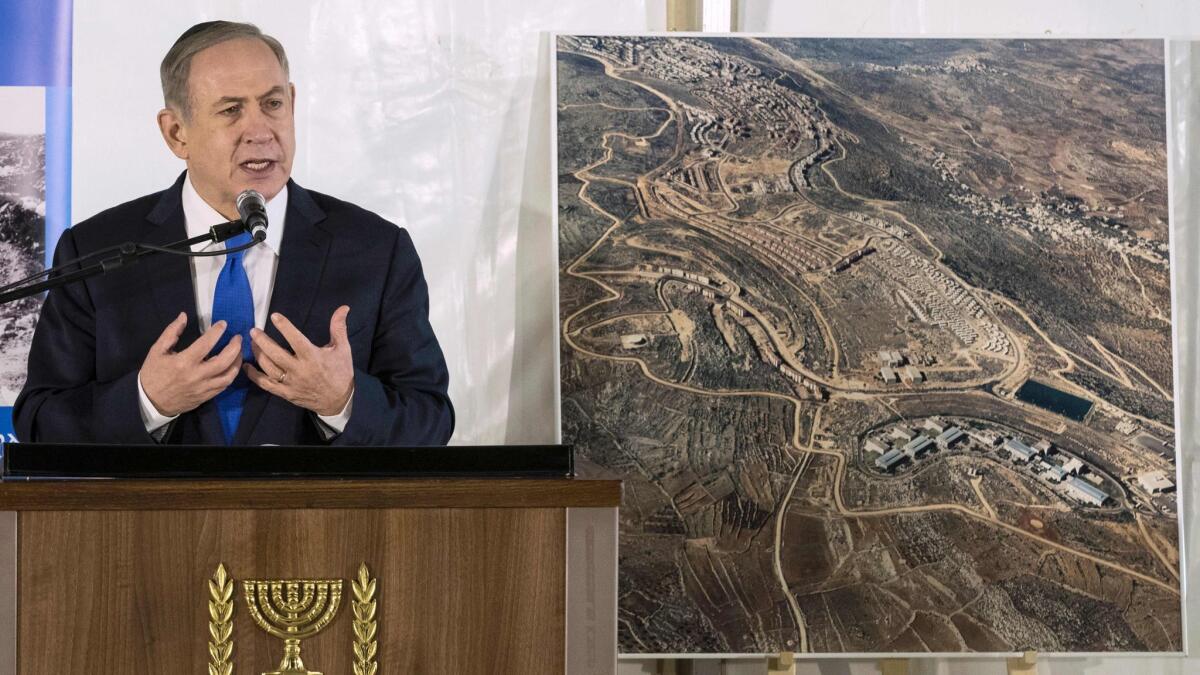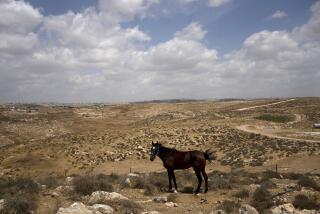Israeli officials look ahead to working with Trump after White House statement on settlements

Reporting from Tel Aviv — Some Israeli officials Friday used an upbeat interpretation of a White House statement indicating that new settlements in the occupied West Bank may not help achieve peace with Palestinians, saying they look forward to working with the Trump administration.
Several officials said they were hopeful of a better relationship with President Trump than the tense one that existed between Prime Minister Benjamin Netanyahu and President Obama. Netanyahu is scheduled to meet Trump in Washington on Feb. 15.
The White House said Thursday that the Trump administration does not believe that settlements are “an impediment to peace” but that building new settlements or expanding existing ones “may not be helpful in achieving that goal.”
Several officials said they did not necessarily see the White House statement as a warning.
“No one can say that we want to hear these announcements, or welcome such statements,” Danny Danon, Israel’s ambassador to the United Nations, said in an interview with Israel Radio.Danon on Friday. “But if you read between the lines … you see that there’s a difference, you see that there’s a new administration and a new atmosphere.’’
Deputy Foreign Minister Tzipi Hotovely said if settlements are not considered an impediment to peace by the Trump administration, “continued building doesn’t hurt the peace process”
A spokesman for Netanyahu said Israel’s settlement policy would be on the agenda for discussion during the Washington trip.
The United Nations, the U.S. and European countries have warned that settlement expansion is endangering chances for peace through a two-state solution for Israelis and Palestinians. The U.N. Security Council in December passed a resolution condemning the settlements as a flagrant violation of international law.
Husam Zomlot, a spokesman for Palestinian Authority President Mahmoud Abbas, said the caution about settlements included in the White House statement was a step in the right direction but was not enough.
“We need actions rather than words to stop the Israeli settlements expansion, which is violating the international law and killing the two-state solution,” Zomlot said.
A few hours before the White House statement was issued Netanyahu promised to establish a new West Bank settlement as a consolation to supporters after Israel security forces acting on a Supreme Court order this week evicted settlers from an unauthorized outpost in Amona.
Since the Trump inauguration two weeks ago, Netanyahu’s government has announced plans for more than 5,000 homes in the West Bank and East Jerusalem.
Israeli officials said the White House’s statement indicating that it doesn’t consider existing settlements in the West Bank as an obstacle to peace marked a substantive shift from the Obama administration’s criticism of the settlements.
Dore Gold, the president of the Jerusalem Center for Public Affairs and an occasional foreign policy adviser to Netanyahu, said the White House statement appeared to tolerate building within existing settlements.
Oded Revivi, the chief foreign envoy of the Yesha settlers’ council, said his group “thanks the White House for asserting that our communities were never an impediment to peace,” the Associated Press reported.
“We look forward to working closely with our friends in the new Trump administration to build a brighter future for all,” he said.
Mitnick is a special correspondent.
ALSO
A divided European Union has one thing in common: Mistrust of Trump
Aid groups see Trump’s travel restriction as ‘a huge step backwards’
More to Read
Sign up for Essential California
The most important California stories and recommendations in your inbox every morning.
You may occasionally receive promotional content from the Los Angeles Times.










